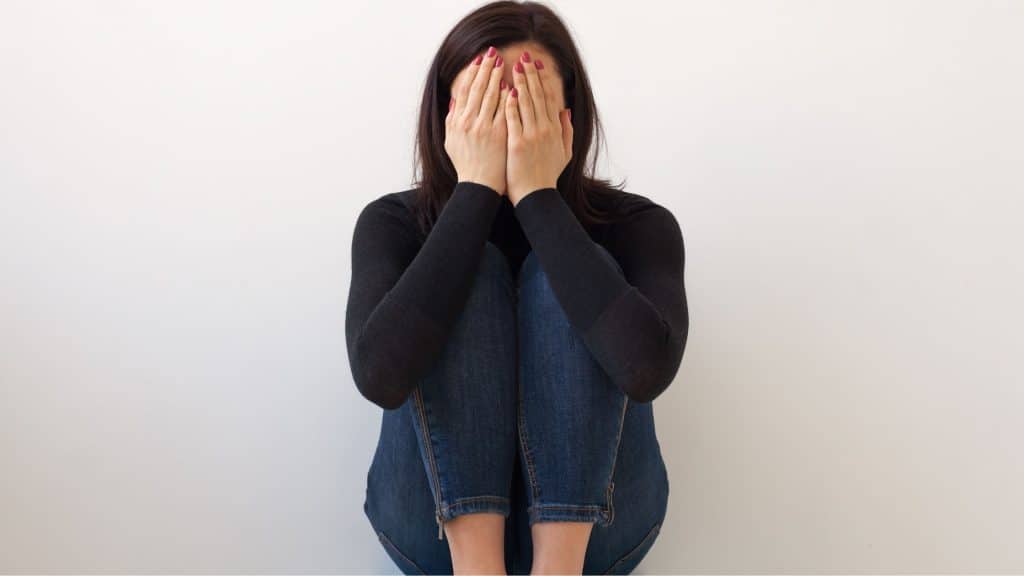You just finished a piece of ooey gooey cheesy pizza and the negative feelings start to surface again… Guilt. Shame. Regret. You start to wonder “Why do I feel guilty after eating?”
Guilt and shame after eating are common experiences that many people encounter. However, this intense feeling doesn’t have to be long-lasting. It’s possible to find food freedom and develop a healthier relationship with food. I, like many others, have overcome these feelings and now work to assist others in achieving their goals while improving their eating habits.
In this post, we will discuss what food guilt is, why you feel it, how it’s holding you back from your goals, and ways to help overcome it.
Hey, I’m Jenn, a Registered Dietitian who has a passion for helping individuals fuel, think, and move towards the best versions of themselves without sacrificing their relationship with food. If you want practical, evidence-based nutrition advice to improve your performance and wellness — Learn how I can help.
Let’s dive in and stop food guilt…
What is food guilt?
Food guilt is a learned behavior that involves the feeling of guilt, shame, or regret after eating something “bad” or “unhealthy”. You feel like something is wrong with you for choosing to make a certain eating decision.
The feeling of food guilt is different for everyone and might sound like:
- I can’t believe I ate that many slices of pizza
- Ugh, I wish I didn’t eat that brownie
- I just ruined my progress by eating a donut
The food guilt can feel overwhelming and relentless and have a serious impact on your mental health and relationship with food.

Why do you feel guilty after eating
Eating is a basic necessity of life, providing nourishment and energy to our bodies. However, there is a 75 billion dollar weight loss industry that is constantly pressuring you through ads and social media to try the latest diet or weight loss supplement/drug.
These companies and influences want us to get stuck in a diet mentality. Why? Because they want you to buy something from them. They want you to feel like you can’t reach your goals without them…keeping you stuck buying the latest supplement/diet.
Some other common reasons you might feel guilty after eating:
Societal Pressures
One major factor contributing to post-meal guilt is societal pressure regarding body image and diet culture. Media portrayal of idealized bodies often creates unrealistic standards that many people strive to achieve. Consequently, indulging in certain foods or eating more than is perceived as necessary may result in feelings of failure or shame.
Diet Culture and Food Morality
Following strict diets or restrictive eating patterns can lead to guilt after meals that deviate from the plan. The mindset cultivated by such diets emphasizes “good” versus “bad” foods, fostering an unhealthy relationship with eating where any deviation from the prescribed plan triggers judgment and self-blame.
A study asked participants if they associated chocolate cake with guilt or celebration. The study found that those who associate chocolate cake with guilt were not healthier but reported less control over food. So, following diet culture rules can hinder your progress.
Emotional Triggers
Emotions play a significant role in our relationship with food, influencing how we perceive our dietary choices. Stress, sadness, boredom, or even happiness can drive individuals towards emotional or mindless eating habits that they later regret.
Unrealistic Expectations
Unrealistic expectations about maintaining a perfect diet perpetuate feelings of guilt after eating because it’s nearly impossible for anyone to adhere strictly 100% of the time without occasional slip-ups. Putting excessive pressure on oneself leads to self-criticism when those expectations aren’t met.
Body Image and Self-esteem
Issues with body image and self-esteem can intensify feelings of guilt after eating. Many individuals struggling with these issues may perceive any indulgence in food as a personal failure, reinforcing negative beliefs about themselves.
Lack of Nutrition Education
Insufficient knowledge about nutrition can result in misconceptions regarding food choices, which subsequently leads to unnecessary feelings of guilt. Understanding balanced eating habits based on reliable information helps alleviate unwarranted guilt associated with consuming different types of food.
Why feeling guilty after eating isn’t helping you
Mental Health Impact:
Feeling guilty after eating can have detrimental effects on mental health. Constantly associating food with guilt creates an unhealthy relationship with eating and can lead to intense, negative emotions and disordered eating patterns. It’s crucial to understand that food should not be a source of shame but rather a means to nourish our bodies.
Self-Perception:
Guilt often stems from societal pressures regarding body image and unrealistic beauty standards. When we allow guilt to consume us after every meal or snack, it reinforces negative self-perception and damages our self-esteem. Focusing on external judgments rather than listening to our body’s needs can create a toxic cycle that hinders overall well-being.
Nutritional Imbalances:
Constantly feeling guilty about what we eat may result in restrictive eating behaviors or engaging in extreme dieting practices that eliminate essential nutrients from our diets. This may lead to nutritional imbalances which can affect physical health over time, causing deficiencies in vital vitamins, minerals, and macronutrients required for optimal functioning.

How to stop feeling guilty after eating
Overcoming food guilt is a journey and will take time. Remember that practice makes progress and give yourself grace. We all deserve nourishment and enjoyment through food without any remorse.
Ditch the Labels:
Understand that food does not define who you are as an individual. Instead of labeling certain foods as “good” or “bad,” focus on cultivating a positive relationship with food overall. Remind yourself that balance is key—a balanced lifestyle includes enjoying a variety of foods in moderation without attaching guilt to any particular choice.
Practice Mindful Eating:
Incorporate mindful eating practices into your daily routine. Slow down, savor each bite, and truly appreciate the flavors, textures, and aromas of your meals. By being present in the moment while eating, you can fully enjoy your food without overindulging or feeling guilty afterward.
Challenge Negative Thoughts:
When guilt arises after consuming certain foods, it’s crucial to challenge negative thoughts associated with them. Remind yourself that no single meal or snack defines your overall health or well-being. Adopt a more compassionate inner dialogue by reframing negative self-talk into positive affirmations about nourishing your body in balance.
Focus on Nourishment:
Shift your perspective away from guilt-ridden thoughts toward appreciating how food fuels and energizes both our bodies and minds. View eating as an act of self-care and nourishment rather than a source of guilt or punishment.
Seek Professional Support:
If feelings of guilt around food persist despite efforts to overcome them independently, seeking professional support from a registered dietitian, therapist, or healthcare provider can be immensely beneficial in addressing underlying emotional triggers and developing personalized coping mechanisms.
Embrace Self-Compassion:
We all make choices based on our circumstances, emotions, or personal preferences at times – and that’s okay! Practice self-compassion by acknowledging that one indulgent meal or snack doesn’t negate all the efforts you’ve put into maintaining a balanced lifestyle. Remember: progress over perfection!
Final Thoughts
People often wonder “Why do I feel guilty after eating?”.
Feeling guilty after eating is common, but it does not have to be a permanent part of your life. The journey towards a healthy relationship with food is not always easy, but it is undoubtedly worth it.
Remember, each step taken towards healing your relationship with food is an opportunity for growth and empowerment.
You deserve to nourish your body without guilt or shame; embrace this new chapter in your life with optimism and determination. Together, with me as your dietitian and ally, you can truly reclaim joy, balance, and well-being in your relationship with food.

Jenn Fink is a licensed and board-certified Registered Dietitian Nutritionist based in Minnesota. Her goal is to help busy people and families prioritize their health by living a balanced lifestyle and feed their families flavorful meals without spending hours in the kitchen. Jenn is passionate about all things food-related and enjoys making complex science easy to understand for her clients and readers.

